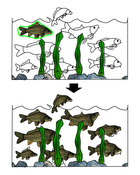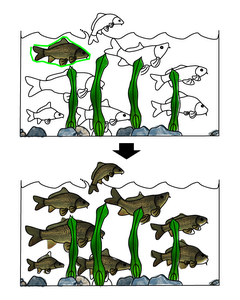Information
- Publication Type: Journal Paper (without talk)
- Workgroup(s)/Project(s):
- Date: November 2014
- ISSN: 1467-8659
- Journal: Computer Graphics Forum
- Number: 8
- Volume: 33
- Pages: 1 – 14
- Keywords: Shape Matching, Texture Transfer, Non-Rigid, Deformable, Edit Propagation, Partial
Abstract
In this paper, we present a method for non-rigid, partial shape matching in vector graphics. Given a user-specified query region in a 2D shape, similar regions are found, even if they are non-linearly distorted. Furthermore, a non-linear mapping is established between the query regions and these matches, which allows the automatic transfer of editing operations such as texturing. This is achieved by a two-step approach. First, point-wise correspondences between the query region and the whole shape are established. The transformation parameters of these correspondences are registered in an appropriate transformation space. For transformations between similar regions, these parameters form surfaces in transformation space, which are extracted in the second step of our method. The extracted regions may be related to the query region by a non-rigid transform, enabling non-rigid shape matching.Additional Files and Images
Additional images and videos
 representative_image:
representative image
representative_image:
representative image
Additional files
 additonal_material:
employed shape descriptors and transformation space visualizations
additonal_material:
employed shape descriptors and transformation space visualizations
 paper:
pre-print version of the paper
paper:
pre-print version of the paper
Weblinks
BibTeX
@article{Guerrero-2014-TPS,
title = "Partial Shape Matching using Transformation Parameter
Similarity",
author = "Paul Guerrero and Thomas Auzinger and Michael Wimmer and
Stefan Jeschke",
year = "2014",
abstract = "In this paper, we present a method for non-rigid, partial
shape matching in vector graphics. Given a user-specified
query region in a 2D shape, similar regions are found, even
if they are non-linearly distorted. Furthermore, a
non-linear mapping is established between the query regions
and these matches, which allows the automatic transfer of
editing operations such as texturing. This is achieved by a
two-step approach. First, point-wise correspondences between
the query region and the whole shape are established. The
transformation parameters of these correspondences are
registered in an appropriate transformation space. For
transformations between similar regions, these parameters
form surfaces in transformation space, which are extracted
in the second step of our method. The extracted regions may
be related to the query region by a non-rigid transform,
enabling non-rigid shape matching.",
month = nov,
issn = "1467-8659",
journal = "Computer Graphics Forum",
number = "8",
volume = "33",
pages = "1--14",
keywords = "Shape Matching, Texture Transfer, Non-Rigid, Deformable,
Edit Propagation, Partial",
URL = "https://www.cg.tuwien.ac.at/research/publications/2014/Guerrero-2014-TPS/",
}


 additonal_material
additonal_material paper
paper